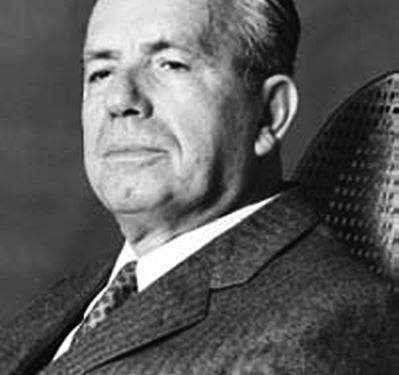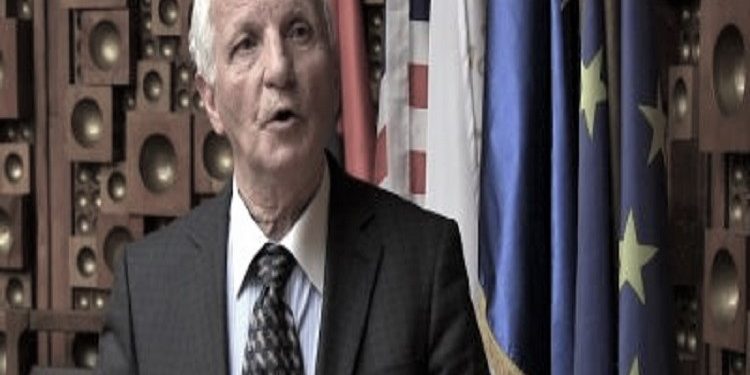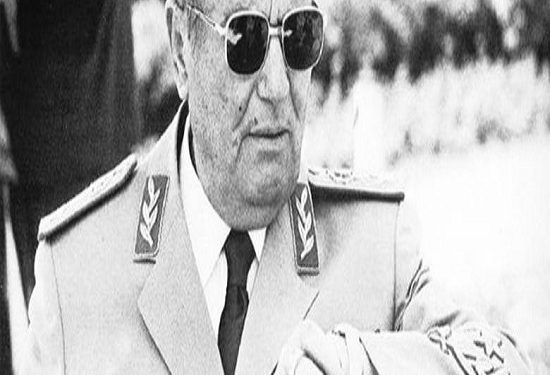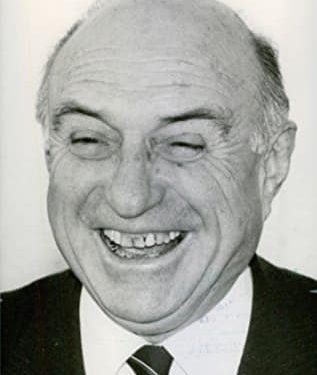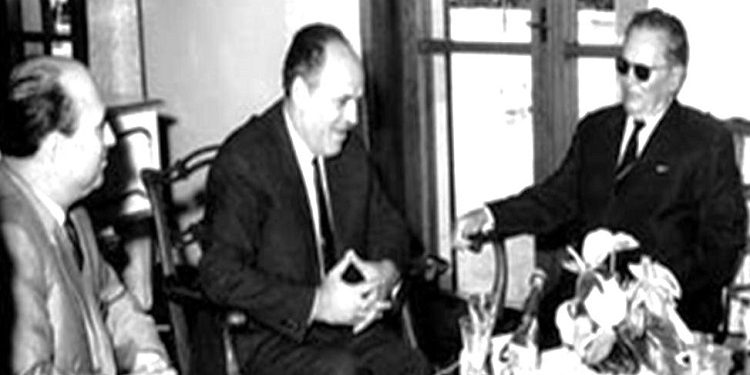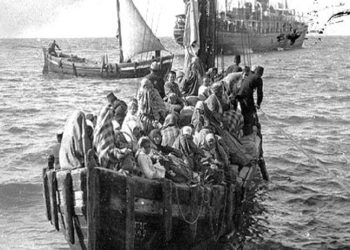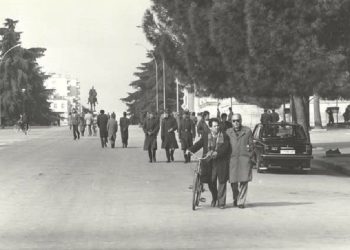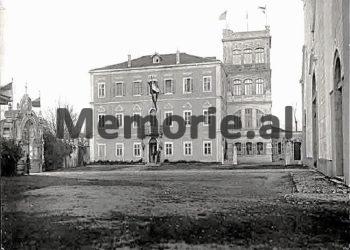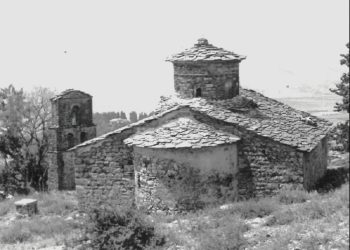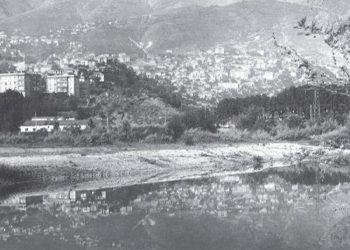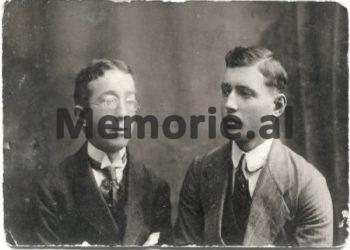Memorie.al / Former political prisoner from Enver Hoxha’s communist regime, Esat Myftari, deputy of the Albanian Parliament and diplomat at the Ministry of Foreign Affairs after the 90s, in a book on the reports of diplomats in the dictatorship, entitled; “Shadows of Albanian-Kosovo relations”, (Princi Publications), is focused especially on the secret reports of those who came from Kosovo. Unknown names, events and facts emerging from the Archives of the Ministry of Foreign Affairs. The events of 1968 and 1981, related to the former Yugoslavia’s relations with Albania, have so far known the most diverse interpretations. For this reason, the politician and diplomat, Esat Myftari says that he started working on his next book; “Kosova and Enver Hoxha”, brought through archival documents, and unpublished until today. Myftari used the diplomatic files of the Ministry of Foreign Affairs of Albania.
In these documents it is stated that he has found events, political and cultural developments, names of people known personally or heard, who are directly or indirectly related, that contained the motive and objective of the reports of Albanian diplomats, especially those accredited in Belgrade, Vienna , Ankara, Istanbul and Paris. Of course, some names mentioned there are no longer alive today. Below, we are publishing part of Myftar’s book, the third chapter, “Lights of Albania-Kosovo relations”!
Excerpt from the book “Shadows of Albania-Kosovo relations”, by Esat Myftari
The documents that have been used for this book are mainly the reports of our diplomats, but written against the background of personal experience and observations, during half a century as a ‘Kosovo immigrant’. It should be borne in mind that the reports were made by our ideological diplomats, with the scope for maneuvering or personal initiative greatly narrowed. But the other thing that stands out the most and surprises you, however for the better, is the content of these reports: In them, there is not so much ideological fanaticism, as I remembered, even sometimes, there is a patriotic and objective concern, reflected for the ear of their superiors.
And at this point, they are cool and cool. However, due to the places where they served and the nature of their human contacts, the selection of our diplomats has a specific character: There were names, especially in delicate moments, generally people who had served in the Albanian secret organs, and who knew closely to the Albanian problem and its living structure”, says Myftari in the introduction.
In this well-known spirit and practice, the most prominent place was occupied by the Albanian nomenclature of Kosovo, where the author mentions some of its members, such as: Fadil Hoxha, Ali Shukria, Veli Deva, Xhavit Nimani, Ismet Shaqiri, who had come out of the war, but also educated in Albania, who had personal acquaintance or friendship with the dictator. This group included well-known Serbian intellectuals and a good part of Belgrade professors.
The duel started on the day of Tito’s arrival in Mitrovica. There he was warmly received by Veli Deva. Tito even kissed him. But such a sign of public sympathy infuriated the Serbs. All the more so when in all his speeches, Tito said almost no good words to the leadership of Serbia, on the contrary, in various forms, he condemned the chauvinistic tendencies of the great state (which meant Serbia).
In response, in the announcements of the first day of his arrival in Mitrovica, the central television did not mention at all the fact that Tito was accompanied by Fadil Hoxha, while the newspaper “Borba” of April 15, an organ close to the party, only gave an announcement about collection of political assets of Kosovo. The next day, both “Borba” and “Politika” briefly published Tito’s speech in this asset, the same text that “Tanjugu” had also given. It was the first time that the central press and the Serbian press made such a clear, blunt and unreserved obstruction.
They also left in silence his speech on Yugoslavia’s relations with other countries, about which Tito was said to have spoken at length. All this was commented on as excessive courage. And the paradox was this: the opposition came from the liberals, who had been more sympathetic to constitutional reforms than all other Serbian currents of the time or tradition. But, apparently, their disagreements about Maspok – Nikezic (Serbian Prime Minister), did not join the chorus against this movement – were very deep and there was no going back between them either.
But the peak of the hostile attitude of the Serbian press reached, when “Politika”, for the meeting of the political activity of the province, published short parts of the main discussions of the meeting, while on the other hand, it gave an important place to the discussion of the member of the federal council, Pavël Zavičevič, who in his speech emphasized the danger that comes to the Serbs in Kosovo from the Albanians, “putting also part of the discussion of Katerina Paternogic, who rejected such an argument as baseless”.
Tito’s focus during this visit on economic issues could also be taken as a tactic, because he had a secret reason for doing so. Soon, the new plenum would be held in Brione, where weighty decisions would be made, so he did not want to get used up and raise premature noises. He contented himself with the public with the words: “The province has submitted several demands framed in the constitutional amendments under discussion” – and promised that these demands would be discussed among the communists when he returned to Belgrade. The only point where he showed his teeth in his characteristic way was the economic-moral sphere.
Our ambassador, Lik Seiti, announced: “From what was announced on television and from what was published in the press, the fact that Tito, anonymously criticized the main cadres who run the country’s economy and warned that measures will be taken against them, draws your attention. He pointed out that even in the past, such as at the trade union congress in 1968, or on the eve of the 9th congress of the Communist League of Yugoslavia in 1969, he made such warnings and in fact a series of measures were taken, removing main, many different people”.
And indeed, he turned these warnings into reality quietly, away from prying eyes and incorrect means, in his favorite place, where his political opponents were dethroned, in Brione. Syrja Pupovci, dean of the Faculty of Law of the University of Pristina, a scientific authority as well as a member of the party structures, since his youth in Belgrade, who had begun to be kept close with sympathy even by the highest structures of the Albanian state (originally wait with political reservations, but very soon a common language was found with him), during his vacation stay in Albania, in a confidential conversation with Sofokli Lazri, the chief censor of Ramiz Ali, in the Ministry of Foreign Affairs, he will explain the following:
“The changes to the constitution were made with Tito’s approval. They were discussed in Brione, for a month in a row and completely isolated from the outside world, with the participation of two or three representatives from the republics and provinces. From Kosovo were Fadil Hoxha and Iljaz Kurteshi, Speaker of the Parliament of Kosovo. The fiercest debates took place in the Serbia-Croatia-Kosovo triangle. Almost 95% of Albanians’ demands were accepted.
Immediately after the meeting, the Serbs began to openly oppose the changes, saying that the Brione meeting was not competent to decide on such a thing. To refute this argument, Titua called the bureau and the leadership of the Communist League of Yugoslavia, where the amendments were discussed and approved once again. But even after receiving the official form, the Serbs did not lay down their arms. Remembering it as the weakest front, they focused the attack against Kosovo, i.e., its autonomy and new rights, foreseen in the amendments.
But the Serbian leadership was faced with two surprises. First, the entire public opinion of Kosovo rose up against it with an unforeseen force. In this case, there was complete unity among the leaders, the youth of the people. And those who remained neutral, even the opportunists, became patriotic. Not only among the Albanians, but also the Serbs of the country, do not dare to go against the current.
Kosovo successfully resisted the Serbian attack even in the field of legal controversy, where the Serbs thought they would dominate completely. Second, the Croats understood that the attack against the autonomy of Kosovo was the beginning of the general Serbian attack against all the amendments. As such, they unmasked him. This conflict came out openly in the public controversy of Tripallo, with the leadership of Serbia.
In defending the amendments, Kosovars have Tito’s encouragement…! Macedonia also supports the demands of the Kosovars, of course, not to the extent and with the strength of the Croats. Krste Crvenkovski demonstratively approached Fadil Hoxha and emphasizes his friendship with him. The Macedonians support the Kosovars now, to receive later as a reward from them, the non-interference, or rather the non-incitement of the Macedonian Albanians’ wishes to join Kosovo.
On the other hand, the position of the Albanians in the Macedonian-Bulgarian dispute is very important. Crvenkovski wants to be playful in the current situation, hoping that the Albanians will repay the friendship with friendship…”. Even for Kol Mirditori, journalist of “Rilindja”, Tito’s aim during this visit was to strengthen the positions of the Albanian leaders in Kosovo and Yugoslavia, indirectly; “it came out in front of the resistance that the Serbian leadership did for giving Kosovo as many rights as possible”.
Serbian counterattack. The new Serbian defeat in Brione was caused by a new counterattack by Belgrade against Pristina. The preparation of the campaign was entrusted to the central press, in particular the Serbo-centrist newspapers “NIN”, “Politika” and “Večerni Novosti”, which had long experience in this direction. The University of Pristina already, which he described as the “home of Albanian irredentism”, so the first blow had to be focused exactly there. Although new, this university had about 12,500 students and the pace of their increase was very worrying for the Serbs: in this year alone, 3,500 students of all categories were registered. There were also Albanian students from Macedonia and Montenegro pouring in, thus giving evidence of an intra-Albanian movement that overcame the unjust borders drawn in AVNOJ and, later, heralded a unique Albanian development and inspiration.
The main argument of the official Belgrade was this: encouraged by the new amendments and especially by the principle of the national key, Albanians were being dismissive and aggressive with the majority and being used abusively, as a legal tool to suppress the Serbian minority. This opinion process exploded at the exact moment when the governing bodies of the university were being elected, which was supposed to consist of two Albanians and one Montenegrin. And this formula, of course, reflected the national structure of employees, students and the population of Kosovo.
In his report, the person in charge, Dhimitër Lamani, wrote that he referred to “Renaissance” on 4 January 1971: “At the meeting of the pedagogical council of the university, when the candidacy of the rector Dervish Rozhaja and his two deputies – Syrja Pupovci and Vera Ivanova, ten lecturers of this university, later accompanied by about 100 Serbian and Montenegrin students, left demonstratively. Brashkovic used his well-known thesis of “majorization” openly, declaring that “the application of the national structure of the province’s population, in the case of the election of leading bodies in the university, means the legalization of the majority against the minority”.
Indeed, reality spoke a different language. Not only was there no majority, but on the contrary, due to the discriminatory heritage, the Albanians were still not able to realize a right to be acquired now, constitutionally. “Most of the pedagogues out of 260 in total were still of Serbian-Montenegro nationality and out of 1,600 boarders, 40 percent were Serbian and Montenegrin. In the philosophy faculty itself, where this rebellion was the focus, of its 12 chairs, eight of them were in the Serbo-Croatian language and only 4 in the Albanian language”, the ambassador continues in his report.
The arrogant actions of the Serbian students also caused clashes on ethnic grounds. It was only the intervention of Albanian pedagogues that avoided a real conflict between them with serious consequences. In addition, all this activity was calculated to coincide in time with the student demonstrations in Zagreb, in order to “highlight” the cooperation of the Albanian-Croat nationalists, and for this purpose, the call that the students of Zagreb, they were directed to support the students of the University of Pristina.
Throughout this campaign, especially after the events in Croatia and Tito’s speeches at the meetings of the Presidency of the League of Communists of Yugoslavia, a war broke out within the party structures, where Latinka Perović, had the opportunity to empty all her chauvinist pride, towards the Albanians of Kosovo. In response, there was a self-organization of Albanian teachers and students. In the faculties and dormitories the duty is set, to prevent any possible actions of Serbian students. The latter’s demands were really provocative. They wanted the establishment of faculties, divided on ethnic grounds, a demand that contradicted not only the laws in force, but also the political efforts in Yugoslavia…!
Meanwhile, the rectorate of Belgrade got into the game, which, as Adil Begolli informs, called the rector of the University of Pristina, Dervish Rozhaja, to give him the blackmail notice that: “…the teachers of Belgrade will not come again in Pristina for teaching. In case they will not come from Belgrade, replied Dervish, we will ask them to come from Croatia or Slovenia. As far as the teachers of Tirana are concerned, they are coming according to the agreement we reached. There are rumors, said Adili, that the Serbs, unhappy with the loss of their privileges in Kosovo, have made the presence of USHT lecturers a problem before Tito, accusing them of dealing with other things!
They were scared by any coordination of pressure – especially after some wavering of Tito – Fadili, for his part, was frequenting private conversations with intellectuals and journalists, you ordered them to be reserved, because it was clear that time was working for the Albanians.
Fadil Hoxha’s meeting with the Albanian ambassador, Lik Seiti
After several unsuccessful attempts to enter into impromptu talks, waiting for representatives, Lika and Fadil, finally agreed to arrange a real meeting for an exchange of ideas. Initially, Fadili suggested that Stane Dollanc also participate in the meeting, but Lika refused. They told him from Tirana that Dollanci had party functions, so the meeting with him could be misunderstood as a party rapprochement between them. The Yugoslav side accepted the Albanian reasoning, even Fadili showed the reason for the preference, which was completely “human” and did not implicate the respective parties in any way.
In conclusion, Fadili went alone. Lunch was left to be eaten at a restaurant some 30 km away outside Belgrade. Minister Nesti Nase was among the most interested in such a meeting, because it was assumed that some letters would be opened and each other’s concerns would be better known. This was the first ministerial meeting with Fadil and it is understandable that the course of the conversation was of particular importance. It was also ordered that it should be clear and speak in a fully audible voice, because it would probably be intercepted by devices installed under the table (no doubt it was based on general practice).
The minister also gave Lika this instruction, which was specifically related to Fadil: “… Be careful not to believe anything he says, but in all cases, like a diplomat, be cool and polite, because he he is Albanian, but he is also Titist and Kosovar with nationalist sentiments and we keep in touch with him. Approaching can also be sincere; however we must guard ourselves, be inside. Time will prove it”! From the very first expressions, it was understood that Fadili had come with very positive government messages, so he touched on pleasant moments for Enver and tried to look as if they were continuing a conversation that had been interrupted a long time ago. Memorie.al




